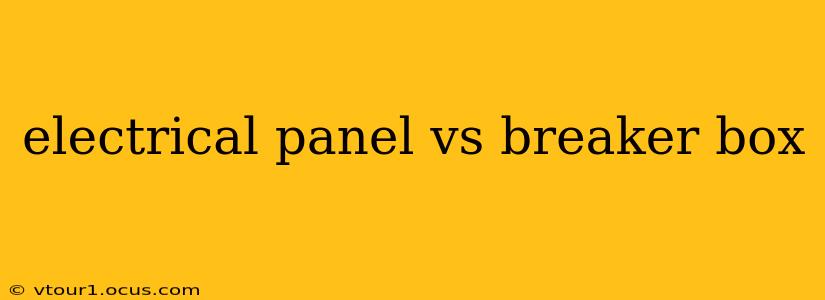The terms "electrical panel" and "breaker box" are often used interchangeably, leading to confusion. While they essentially refer to the same device, there are subtle distinctions worth exploring. This comprehensive guide will clarify the differences and delve into the essential aspects of these critical components of your home's electrical system.
What is an Electrical Panel?
An electrical panel, also known as a load center, is the central distribution point for electricity in your home or building. It receives power from the utility company's power lines via the service entrance conductors (typically the wires entering your home through a meter). Inside the panel, this power is safely divided and routed to various circuits throughout your property. Each circuit is protected by a circuit breaker, which prevents overloads and short circuits that could cause fires or damage appliances. Modern panels are typically made of metal and are designed to withstand high temperatures and electrical stresses.
What is a Breaker Box?
A breaker box is a colloquial term for the same device described above—the electrical panel. Essentially, it's a more casual and less technical name for the enclosure housing the circuit breakers. The term "breaker box" emphasizes the function of the contained circuit breakers, highlighting their crucial role in protecting your electrical system.
Are Electrical Panels and Breaker Boxes the Same Thing?
Yes, for all practical purposes, an electrical panel and a breaker box are the same thing. The distinction is largely semantic; "electrical panel" is the more formal and technically correct term, while "breaker box" is a more common and readily understood term in everyday conversation.
What are the different types of electrical panels?
There are various types of electrical panels categorized based on their construction material, voltage rating, and the type of circuit breakers they use. While the fundamental function remains the same, the specifics differ:
- Material: Most modern panels are made of steel, offering excellent protection and durability. Older panels might be made of other materials but are less common now due to safety and performance concerns.
- Voltage: Panels come in different voltage ratings, typically 120V, 240V, or both, depending on the electrical requirements of the building they serve.
- Circuit Breaker Type: The type of circuit breakers used, such as standard circuit breakers, arc-fault circuit interrupters (AFCIs), or ground-fault circuit interrupters (GFCIs), influences the overall safety and protection offered by the panel.
How does a breaker box protect my home's electrical system?
A breaker box (or electrical panel) protects your home's electrical system in two crucial ways:
- Overload Protection: If a circuit draws more current than it's designed to handle, the corresponding circuit breaker trips, cutting off the power to that circuit and preventing overheating or fire.
- Short Circuit Protection: If a short circuit occurs (a direct connection between a hot wire and a neutral or ground wire), the circuit breaker will quickly trip, preventing damage to appliances and preventing electrical fires.
What size breaker box do I need?
The size of the electrical panel you need depends on the total amperage required by your home's electrical system. This is determined by the number and type of appliances and electrical devices you have. A qualified electrician can assess your electrical needs and recommend the appropriate size panel. Attempting to determine this yourself is dangerous and can lead to potentially hazardous situations.
How often should I have my electrical panel inspected?
Regular inspection of your electrical panel by a qualified electrician is highly recommended. The frequency depends on factors like the age of your panel, its usage, and any noticeable issues. However, a thorough inspection every few years is generally considered good practice to ensure its continued safe and efficient operation. Early detection of problems can prevent costly repairs and potentially dangerous situations.
In conclusion, while the terms "electrical panel" and "breaker box" are frequently used synonymously, understanding the nuance helps in discussing your home's electrical system accurately. Regardless of the term used, the significance of this central component in maintaining safety and preventing electrical hazards cannot be overstated. Regular maintenance and professional inspections are crucial for ensuring a safe and reliable home electrical system.
